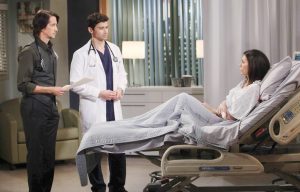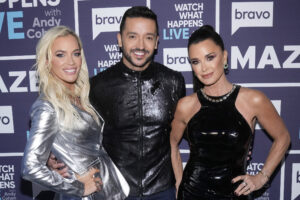On February 20, GH’s seemingly invincible Anna Devane was diagnosed with polycythemia vera (PV), a rare blood cancer, which is treatable, but not curable. Portrayer Finola Hughes spoke to Digest about preparing for the arc, as well as what it portends for her Anna. “It’s interesting to play a strong character who suddenly feels as if she is felled by something,” she notes.
Soap Opera Digest: How did you find out about Anna’s cancer?
Finola Hughes: Last year, I was on set, or actually just walking off set, and Frank [Valentini, executive producer] called me over and said, “So, this is what’s going to happen. We want to do a story that raises awareness about these rare cancers, and we’ve been talking and we think Anna should get this rare blood cancer.” And I was just standing there going, “Okay [laughs].” And he goes, “It’s okay; it’s treatable. It’s a treatable illness and we’re going to kind of walk along this journey with Anna and there will be a lot of opportunities for you to work with Robin, Kimberly McCullough, and we just think it’s a good match.” I kind of walked away and didn’t really ask any more questions. A few different conversations happened as time went on and he told me the name of the disease, and we sort of went from there. The whole story started to build and it became a big undertaking and I had the good fortune of meeting with a patient, a woman who has PV, and was able to ask a lot of questions and build what Anna would be going through from that. It’s interesting to play a strong character who suddenly feels as if she is felled by something.
Digest: That’s what makes it interesting to me, because Anna is such an active, kick-ass kind of character. It’s not like she has a desk job; she’s a super-spy, she’s a fighter. So, what would that diagnosis be like for her psychologically, as well as practically?
Hughes: We answer those very questions, and the lovely patient who I met was incredibly forthcoming about that. She was an incredible speaker and she told me about how she gets very tired and how annoyed she gets at that and how she has had to say, “Okay, I can’t do that, but I can do this, so I will do this. I maybe can’t swim as far as I used to, but I can swim.” It became very positive, actually. She was very positive in the way that she deals with and sort of attacks her blood cancer on a daily basis and how she marches through it. It was great to then apply that to what my character will feel like. And my character does, indeed, face all of that in the first two or three weeks after her diagnosis.
Digest: How do you feel about taking this on?
Hughes: I’m happy to be part of this awareness and to bring awareness to a rare blood cancer. I have had dealings with cancer in my own family, and I kind of felt as if what you can bring out in this are the human moments that you have with each other, the dialogues that people have with each other about any kind of illness. It gave me an opportunity to play in that realm of conversations that people do have, that I had with my own mother and had with my own family when my mother was very sick. It shines a light on those human moments and if the writers get it right, which they do so many times on our show, then I think we will be able to portray some of those moments will resonate with people who have perhaps walked this walk. I feel like soaps do two things. We take you on a big ride, and we go and do crazy stuff — and especially my character, my character is one of the characters who does that. Yet also the nugget, the nucleus of our show, is human contact, and this is a perfect story where we can actually use the breadth of our storytelling, holding that nucleus really strong and making those human contact moments invaluable, and also telling the greater story that we do on soaps. For me, it’s what I kind of love about playing a soap opera character. I get to wield a gun and play a spy; however, what I hold really dear and important and a lot of my inner circle that work with me feels the same way, are those human contact moments. That’s what makes me get out of the car in the morning and walk to work, because I get excited about those scenes, I really do.
Digest: What did it mean to you to have Kimberly McCullough there for this storyline?
Hughes: Oh, it’s everything. I really take the responsibility of trying to tell the story very seriously, and to have Kimberly and Matt Cohen [Griffin] and Michael Easton [Finn] there as support, people that I hold very dear, and none more so than Kimberly, because I’ve known her so long, made my job very easy. I really only react to what other actors are doing, and so my job was made 100 percent easier by having my scenes filled with these wonderful actors. It’s a difficult story to tell. However, I want the outcome of this to feel very inclusive, because the myeloproliferative neoplasms, the group of cancers that we are talking about, can easily be left undiagnosed. People can keep going in with symptoms, and we talk about that on the show. We talk about not being alone; Anna talks about not being able toface this diagnosis alone. And if we do one thing right in this story, [I hope] it is to help people that maybe haven’t had a diagnosis or are considering pushing for a different kind of diagnosis or pushing their doctor to look at something else, that it might give them a moment of pause to ask some more questions. And then also to find out that even if they do get diagnosed with this rare blood cancer, they’re still not alone, that there is a whole community of people out there who are there to support them. I feel that if we do one thing right, it will be that. That’s what I’m hoping for.

JPI
Digest: What kinds of things did you want to know about when you had the chance to speak with someone who is living with PV?
Hughes: I asked her a lot about her symptoms. That was the most important thing to me. I wanted to know how she felt. I wanted to know how she felt when she didn’t feel good and how she felt at other times. I kind of was able to hopefully establish kernels of that within Anna, the dizziness and the different symptoms that she had and also, how to build up to it. I also asked about her family and I asked how they reacted. I asked about how she felt about not being able to do certain things. There was a huge amount of strength in this woman, and I thought, “Okay, so Anna won’t stop being Anna. She’ll just have to fight a little harder to maybe get half way or three quarters of the way to Anna the hero. So maybe Anna the hero has to ask for help.” And that’s interesting to me because sometimes you don’t always want to be the “I got this!” person. It’s kind of nice to have your fellow human carry you along for a moment. I found a real wealth of information in this lady and how kind people are who reach out. She talked about this website, www.voicesofmpn.com, and about how it helped her. The most beautiful story was that her blood cancer actually developed into another kind of blood cancer, and one day she was sitting in a room waiting to go in and be treated and she started a conversation with another gentleman who was sitting opposite her in the same town as her, and he said, “Oh, I have this.” She couldn’t believe it! It was the first person in 10 years she had met who had the same rare blood cancer as her and I just thought, “Oh, my gosh, how alone you must feel.” We are all left alone with our thoughts at the end of the day and those thoughts can, you know, go big or go small and you can sit there and build these big monsters in your head. But something shared is halved; a trouble shared is a trouble halved. So I just thought it was a beautiful story, that she met this person.
Digest: Frank assured you from the start that PV was not a death sentence for Anna, but did you have any trepidation about how it might limit her?
Hughes: You know, I think there’s opportunity in the limitations. He did immediately follow up telling me with, “It’s okay, you’re not going to die,” but I do see opportunities in her limitations because it’s just as interesting to play someone who maybe can’t reach the potential on a daily basis that they used to. There’s melancholy in that and I find that interesting. And also, there would be even more spirit of heroism in overcoming something that may be seen as a limitation. You know, I work with the Art of Elysium and when I go to the children’s hospital and I see those children who are long-term patients and they’re facing diseases, fighting daily, some with diseases that can be treated and others, maybe not, I see them as the true heroes, honestly. Because they just keep fighting. On a storytelling front, Anna’s a fighter, and so is her daughter, Robin, who fights daily with an ongoing disease and prognosis. So, heroism is there even in the limitations. And it’s a great honor to be part of telling this story, honestly.
For more information on polycythemia vera and other rare blood diseases, visit www.voicesofmpn.com.








